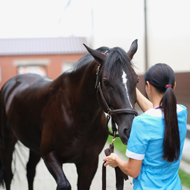London Zoo welcomes second gorilla baby in month
The newborn is a half-sibling to the baby gorilla that was born in January.
London Zoo has celebrated the birth of a second western lowland gorilla, just three-and-a-half weeks after another gorilla baby.
The newborn, which arrived at 7.44pm on Thursday, 8 February, is an important addition to the zoo’s programme to save the critically endangered species.
The mother, Effie, first went into labour at 7.04pm, in the gym area of the zoo’s Gorilla Kingdom. However it soon be came clear that Effie’s birth would not be as straightforward as the zoo’s previous birth.
When the baby gorilla was born it was wrapped in its umbilical cord, which the zookeepers feared would put it at risk. Although the infant appeared healthy, the keepers kept monitoring its progress over the weekend to ensure there were no further issues.
The gorilla keepers were relieved to see that the cord did not cause any issues, with the baby continuing to feed and the cord soon detaching.
The newborn is a half-sibling to the baby gorilla that was born in January to Mjukuu. The keepers will be unable to identify the new arrival’s sex until Effie allows them to do so.
Both gorillas were fathered by silverback Kiburi, who was brought to the zoo from Tenerife in November 2022 as part of a conservation breeding programme.
The programme aims to ensure the next generation of the gorilla sub-species is genetically diverse and healthy.
The zookeepers hope that the new additions will raise awareness of the critically-endangered species. London Zoo says that poaching and disease has caused numbers in the wild to decline by 60 per cent in the last 25 years.
Kathryn Sanders, London Zoo’s primate section manager, said: “We’re over the moon to have a second gorilla infant born here at London Zoo in the space of a month – these babies are an important addition to the conservation breeding programme for this endangered species, and just as crucially, great additions to our troop.”
She added: “The two youngsters will now grow up side by side, much like their older siblings Alika and Gernot did – they’ll love having a permanent playmate!”
Image © London Zoo/ZSL



 The BEVA has opened two new roles on its Nurse Committee.
The BEVA has opened two new roles on its Nurse Committee.